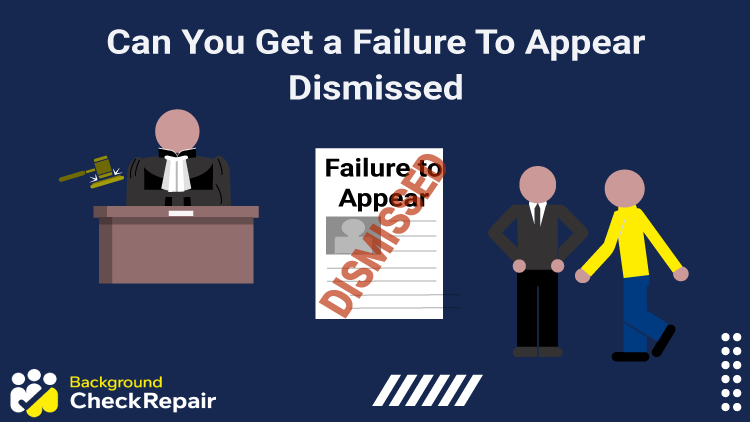
Can you get a failure to appear dismissed? This is a question that many people charged with an FTA often ask.
A failure to appear (FTA) is a charge brought against an individual who was required to attend court but failed to do so.1
If you have been charged with an FTA, there may be ways to have the charge dismissed, depending on the circumstances and jurisdiction. However, different jurisdictions have different rules, and only a qualified attorney can help you navigate such cases.
What are the chances of having your FTA dismissed then?
This complete guide explains the answer to the question, when can you get a failure to appear dismissed, that way you can make sure your criminal records are clear of the violation.
5 Reasons a Failure To Appear Charge May Be Dismissed
Can you get a failure to appear dismissed? The chances of having a Failure to Appear dismissed depend on the specific circumstances of the case and jurisdiction.13
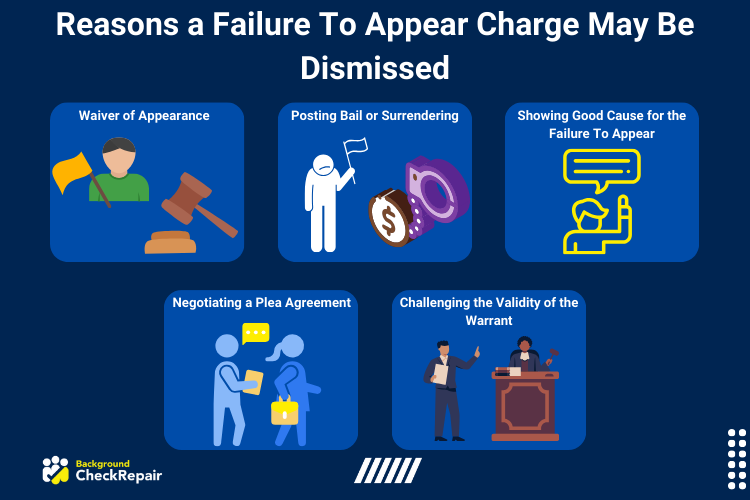
An attorney can evaluate the case and advise on the likelihood of dismissal. Below are some of the common reasons you can get an FTA dismissed.
#1 Waiver of Appearance
In some cases, the judge may allow you to waive your appearance in court and have the charge dismissed.
#2 Posting Bail or Surrendering
In some cases, posting bail or surrendering to the court can result in the FTA charge being dismissed.
#3 Showing Good Cause for the Failure To Appear
If a defendant can demonstrate that there was a good reason for their failure to show up in court, the court may consider dismissing the FTA charge.
#4 Negotiating a Plea Agreement
In some cases, a defendant may be able to negotiate a plea agreement with the prosecutor that includes the dismissal of the FTA charge in exchange for a guilty plea to another charge.
#5 Challenging the Validity of the Warrant
If a defendant believes that the warrant for their arrest was not validly issued, they may be able to challenge the warrant and have the FTA charge dismissed.
Can You Get a Bench Warrant Recalled?
A bench warrant is an order from a judge for the arrest of a person who fails to show up in court when required to or has otherwise violated a court order.8
If you have a bench warrant, you may be able to have it recalled, which means the warrant will be canceled, and you will no longer be subject to arrest.2
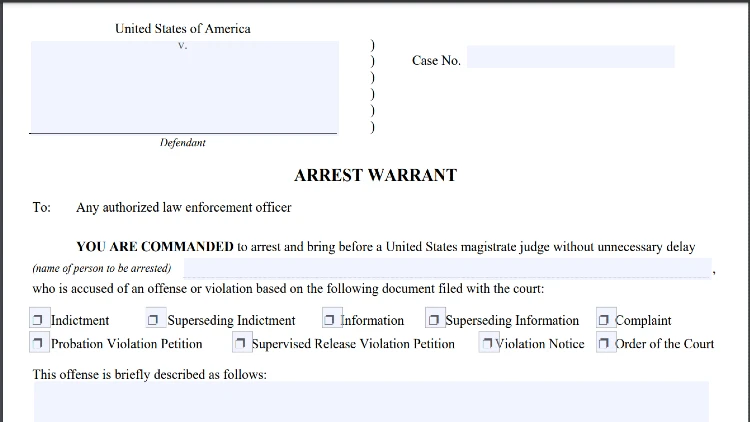
(Image: Federal Judiciary14)
The process for recalling a bench warrant can vary depending on the jurisdiction, but some common steps to recall a bench warrant include:
- Contacting an attorney
- Surrendering yourself
- Paying the fines
- Appearing in court
What Happens When You Turn Yourself In for a Bench Warrant? Can You Get a Failure To Appear Dismissed?
Can you get a failure to appear dismissed if you turn yourself in? Not really.
What happens when you turn yourself in for a bench warrant is you will likely be taken into custody by the police. You will then be booked and processed, which may include being searched, fingerprinted, and having your mugshot taken.
You will also be given a court date to appear in front of a judge, who will determine the next steps in your case, which may include setting bail or ordering your release on your own recognizance. It’s recommended to have a criminal defense attorney represent you in court.
If You Have a Warrant, Can You Just Pay It?
To those asking, If you have a warrant, can you just pay it?
In some cases, it may be possible to resolve a warrant by paying the fine or fee associated with the warrant.7 However, this depends on the specific circumstances and the type of warrant issued.
It’s always best to check with the court or law enforcement agency that issued the warrant to determine the specific steps to resolve it. In some cases, it may be necessary to show up in court and deal with the warrant in person.
What Are Signs Your Case Will Be Dismissed? Can You Get a Failure To Appear Dismissed?
There are several signs your case will be dismissed, including insufficient evidence to prove the charge, a lack of jurisdiction, a violation of the defendant’s rights, a mistaken arrest, and a plea bargain agreement.
However, it’s important to note that each case is unique, and the ultimate decision to dismiss a case lies with the judge or prosecuting attorney.
Also, a good lawyer can help you determine the answer to the ‘Can you get a failure to appear dismissed?’ question with the facts of your case.
How To Plead a Case for Recall: Can You Get a Failure To Appear Dismissed?
Pleading a case for recall bench warrants involves convincing the judge to cancel the warrant and allow you to resolve your case without being subject to arrest.
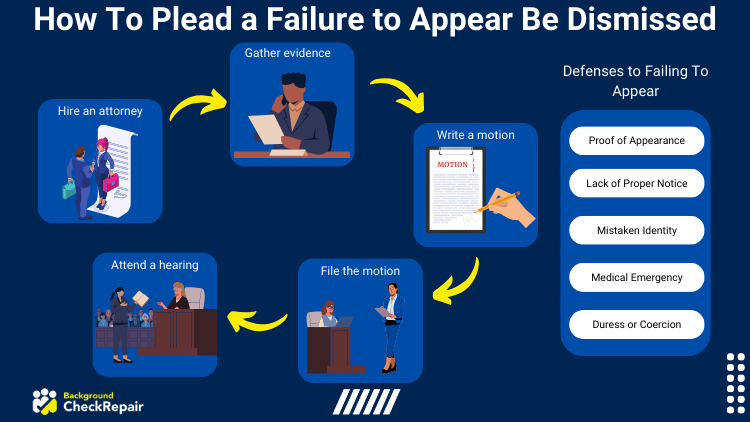
Here are some steps that you can follow to plead your case for recall.3
- Hire an attorney: An attorney can advise you on the specific laws and procedures in your jurisdiction and can represent you in court.
- Gather evidence: You may need to provide evidence to support your case, such as proof of medical emergencies, financial hardship, or other mitigating circumstances that prevented you from appearing in court.
- Write a motion: Your attorney can help you draft a motion to recall the bench warrant, explaining why the warrant should be recalled and outlining the steps you will take to ensure you will show up in court in the future.
- File the motion: Once the motion is drafted, it must be filed with the court and served on the prosecutor.
- Attend a hearing: The judge will schedule a hearing to consider your motion. During the hearing, you and your attorney will have the opportunity to present your case and argue why the bench warrant should be recalled.
After that, you just wait for a decision from the judge.
Can You Get a Failure To Appear Dismissed: Defenses To Failing To Appear
Some common defenses to an FTA charge include:
Proof of Appearance
If you can provide proof that you were present in court on the date you were required to attend, you may be able to successfully defend against the charge.
Lack of Proper Notice
If you did not receive proper notice of the court date, such as if the notice was sent to the wrong address, you might have a defense against the charge.4
Mistaken Identity
If you were not the person who was required to show up in court, you might be able to defend against the charge by showing that you were not the person who was properly served with notice of the court date.
Medical Emergency
If you had a medical emergency on the day you were supposed to show up in court and can provide evidence of the emergency, you might be able to defend against the charge.
Duress or Coercion
If you failed to show up in court because you were being threatened or coerced, you might be able to use this as a defense against the charge.
Penalties For Failing To Appear
Some common penalties for failing to appear include:
Monetary Fines
A person who is found guilty of FTA may be required to pay a fine, which can range from a few hundred to several thousand dollars.
Jail Time
In some cases, a person found guilty of FTA may be sentenced to serve time in jail, which can range from a few days to several months, depending on the circumstances.5
Bench Warrant
If a person fails to show up in court, a judge may issue a bench warrant for their arrest. If the person is later arrested, they may be subject to additional penalties, such as fines or jail time.
Increased Charges
If a person fails to show up in court, the prosecutor may file additional charges against them, such as contempt of court or obstruction of justice. These charges can carry additional fines and jail time.
Driver’s License Suspension
In some jurisdictions, the Department of Motor Vehicles may suspend the driver’s license of a person who fails to show up in court, making it illegal for them to operate a motor vehicle.6
Responding to Defendant’s Failure To Appear
If a defendant does not show up in court, the next steps as regards responding to defendant’s Failure To Appear will depend on the jurisdiction and the specific circumstances of the case.
Here are some common responses to a defendant’s failure to appear:
Issuance of a Bench Warrant
If a defendant does not show up in court, the judge may issue a bench warrant for their arrest. The bench warrant allows law enforcement officers to make an arrest of the defendant and bring them before the court.
Increase in Bail
If a defendant does not show up in court, the judge may increase the defendant’s bail amount,12 making it more difficult for the defendant to be released from custody if they are later arrested.
Forfeiture of Bail
If a defendant does not show up in court and has posted bail, the bail may be forfeited, and the defendant may be required to pay the full amount.
Suspension of Driver’s License
In some jurisdictions, the Department of Motor Vehicles may suspend the driver’s license of a defendant who fails to show up in court, making it illegal for them to operate a motor vehicle.
Additional Charges
If a defendant does not show up in court, the prosecutor may choose to file additional charges against them, such as contempt of court or obstruction of justice. These charges can carry additional fines and jail time.
Voluntary Dismissal With Leave To Reinstate (“V/L”)
A Voluntary Dismissal with Leave to Reinstate (“V/L”) is a type of legal procedure that allows a case to be temporarily dismissed by the plaintiff or the prosecuting party, with the option to bring the case back to court at a later date. The V/L is usually granted when the plaintiff or the prosecuting party needs time to gather more evidence or resolve some issue outside of court before proceeding with the case.
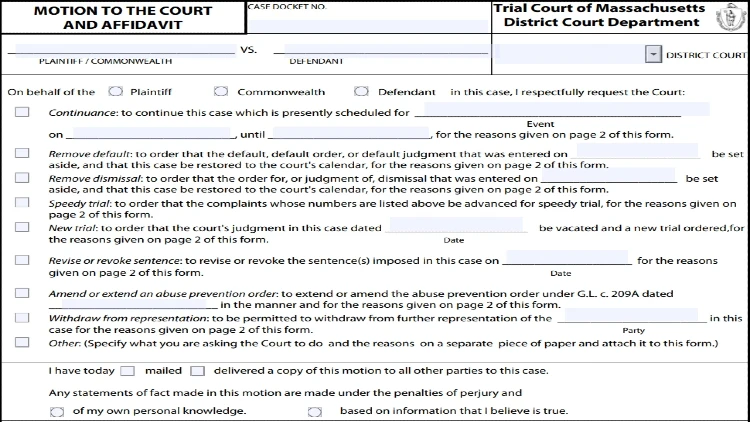
(Image: Commonwealth of Massachusetts15)
In a V/L, the court agrees to dismiss the case without prejudice, meaning that the plaintiff or the prosecuting party retains the right to bring the case back to court at a later date. The V/L typically includes a deadline by which the plaintiff or the prosecuting party must file a motion to reinstate the case, or the case will be dismissed permanently with prejudice, meaning that the case cannot be brought back to court again.
Criminal Charges For Failing To Appear in Court: What Are the Consequences of Failure To Appear in Court?
In many jurisdictions, failing to show up in court (also known as “FTA”) is considered a criminal offense and can result in additional charges being filed against the defendant.
What are the consequences of Failure to Appear in court, you may ask?
Here are some of the common criminal charges for failing to appear in court include:
Contempt of Court
Contempt of court charges can be filed against a defendant who fails to show up in court as ordered and can result in fines or jail time.
Obstruction of Justice
Obstruction of justice charges can be filed against a defendant who intentionally fails to show up in court and can result in significant fines and jail time.10
Bail Jumping
Bail-jumping charges can be filed against a defendant who fails to show up in court after posting bail and can result in the forfeiture of bail, fines, and jail time.
Fugitive From Justice
If a defendant does not show up in court and a bench warrant is issued for their arrest, the defendant may be charged with being a fugitive from justice. They may also face additional fines and jail time if caught and returned to the jurisdiction.
Do Dismissed Charges Show Up on a Background Check?
For those wondering whether dismissed charges can still appear on a records check, the answer is dismissed charges may appear on a background check, but it depends on the specific circumstances and the type of background check conducted. Some vaieties of background investigations will include dismissed charges, while others may only show convictions.
Additionally, some states have laws that limit what can be reported on a background check. It’s always best to check with the background check provider for more information.
Can You Be Denied Employment for Dismissed Charges?
To those asking if they can be rejected for a job due to dismissed charges on their record, here are some of the things that should be known.
An employer can legally consider dismissed charges when making employment decisions in some circumstances. However, it depends on the specific laws of the state and the type of job being applied for.
Some states have laws that limit what can be considered on a background check. It is always best to be honest about your criminal history and to check with the employer for their specific policies regarding background checks.
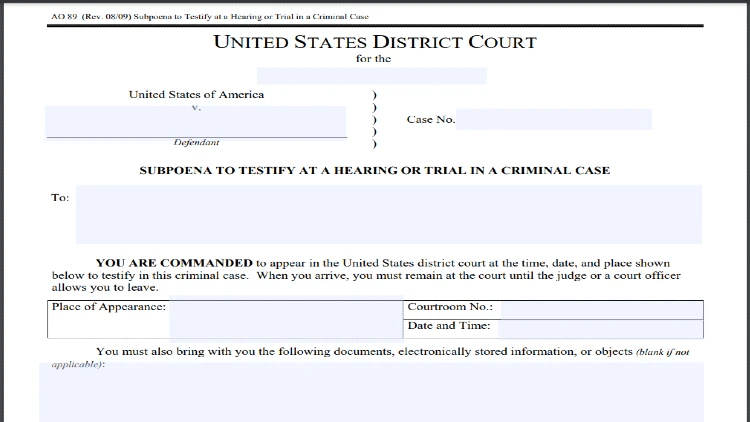
(Image: Federal Judiciary16)
Witnesses who fail to appear in court can also get into trouble or significantly impact the case’s outcome. They may be found in contempt of the court, get fined, or have the case postponed, adjourned, or dismissed.
Failing to show up in court can have serious consequences, including a bench warrant, the forfeiture of bail, additional criminal charges, and the imposition of fines and jail time. If you have been charged with failure to appear, it’s important to consult an attorney to help you understand your rights and options.
They will also guide you through the legal process, negotiate a plea agreement,11 or challenge the warrant’s validity for your arrest.
Therefore, the answer to the question ’Can you get a failure to appear dismissed?’ is yes, but various factors determine that.
Frequently Asked Questions About Can You Get a Failure To Appear Dismissed?







